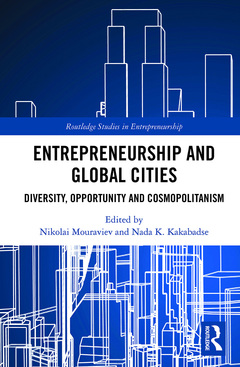Entrepreneurship and Global Cities Diversity, Opportunity and Cosmopolitanism Routledge Studies in Entrepreneurship Series
Coordonnateurs : Mouraviev Nikolai, Kakabadse Nada K.

Global cities with a largely cosmopolitan environment, such as Auckland, Berlin, Dubai, London, New York, Shanghai or Singapore, are successfully developing and attracting entrepreneurs from all over the world. This book elucidates the policy approaches related to the formation of the cosmopolitan environment that supports entrepreneurship in large urban areas. The book?s core theme is the relationship between cosmopolitanism and entrepreneurship, with the latter viewed as a key driver of economic growth, sustainability and prosperity. The book argues that successful entrepreneurship rests on the two pillars of the cosmopolitan environment: diversity and the creation of business opportunities. In contrast to globalisation?s standardised solutions in policy, commerce, banking and social issues, cosmopolitanism allows individualised value and solutions, whereby actors?entrepreneurs, businesses, families, interest groups, governments, non-governmental organisations and virtual communities?enjoy diversity as a norm.
The book pays special attention to under-researched topics, such as threats to sustainability in cosmopolitan cities; why cosmopolitan cities attract immigrants with a highly independent mindset; the impact of religious norms on female and male entrepreneurs; varying experiences of local and expatriate entrepreneurs; and the diff erences in doing business by female entrepreneurs, stemming from their nationalities and residence status. The book off ers conceptual insights into the enablers of entrepreneurship in cosmopolitan cities and urban governance, complemented by case studies based on ? eldwork in Dubai, Hamburg, Istanbul, Karachi, Kyiv, London, Moscow and Tel Aviv. The book will appeal to those who study or teach cosmopolitanism, globalisation or urban development concepts, and those professionals who are considering the possibility of doing business or working as an expatriate in a cosmopolitan city.
Chapter One: Introduction: Toward a Deeper Conceptualisation of Cosmopolitanism in Global Cities
Nikolai Mouraviev and Nada K. Kakabadse
Part I The Cosmopolitan Environment: Traits, Challenges and the Trends
Chapter Two: Sustainable Urban Growth and the Cosmopolitan Environment: The Role of Power in Promoting Diversity, Opportunities and Entrepreneurship
Nikolai Mouraviev and Nada K. Kakabadse
Chapter Three: The Modern Land of Opportunity: Cosmopolitan Cities Attract Independent Immigrants
A. Timur Sevincer, Michael E. W. Varnum and Shinobu Kitayama
Chapter Four: From Sand Dunes Northward of Jaffa to a Cosmopolitan City: Tel Aviv Entrepreneurs’ Experiences
Nada K. Kakabadse and Nikolai Mouraviev
Chapter Five: Cosmopolitanism and Entrepreneurship in Istanbul and London: A Symbiotic Relationship in Context
Berk Kucukaltan and Mustafa F. Ozbilgin
Part II Diversity and Opportunities in Cosmopolitan Cities: Gender and Entrepreneurship
Chapter Six: Female Entrepreneurs in Cosmopolitan Dubai
Nada K. Kakabadse and Nikolai Mouraviev
Chapter Seven: Barriers to Female Entrepreneurship in Karachi
Mustafa Ali
Part III Cosmopolitan Cities in Eastern Europe
Chapter Eight: Moscow: A Global City Under Siege
Ivan Kariakin and Nikolai Mouraviev
Chapter Nine: Kyiv: An Emergent Cosmopolitan City
Yeliena Prokhorova
Part IV Conclusion
Chapter Ten: Entrepreneurship and Governance in Cosmopolitan Cities: Lessons Learned
Nikolai Mouraviev and Nada K. Kakabadse
Dr Nikolai Mouraviev is a Senior Lecturer in Business and Management at Abertay University, Dundee, Scotland, UK. Previously he has held teaching positions at KIMEP University, Kazakhstan; Wayne State University, US; and Viterbo University, US. His research focuses on public–private collaboration and governance in transitional nations.
Dr Nada K. Kakabadse is Professor of Policy, Governance and Ethics, Henley Business School, University of Reading, UK. Professor Kakabadse has extensive experience in researching governance, leadership, top teams, boards and directorship. She has co-authored twenty-two books and has published more than 200 scholarly articles.
Date de parution : 03-2021
15.2x22.9 cm
Date de parution : 06-2019
15.2x22.9 cm
Thèmes d’Entrepreneurship and Global Cities :
Mots-clés :
UAE Citizen; City Level Indicators; Strong Transformational Leadership; Maria Umar; Aga Khanis; Innovative Ecosystem; UK Rate; BNP Paribas; Global Entrepreneurship Index; Cosmopolitan Environment; Urban Cosmopolitan Environments; Yuriy Luzhkov; Cosmopolitan Cities; Entrepreneurship Support Programmes; Tel Aviv Yafo; Expatriate Women; Cosmopolitan Disposition; Female Entrepreneurship; Tel Aviv; Cosmopolitan Entrepreneurs; Book’s Main Argument; Cosmopolitan Mindset; Cosmopolitan Habitus; Foreign Entrepreneurs; Higher Entrepreneurial Activity
